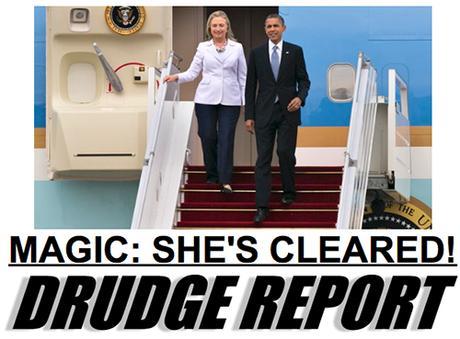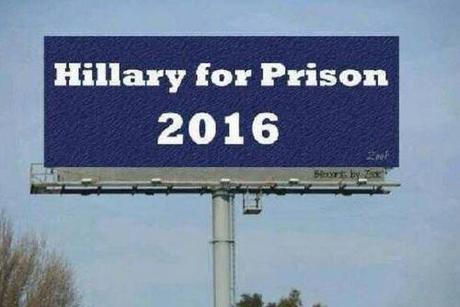Jay B. Gaskill is an attorney; former Public Defender of Alameda County, CA (1989-1999); former Democrat and now a political Independent. He is also my friend and one of the smartest and fairest-minded men I know.
In the following essay, Gaskill employs his legal knowledge and experience to analyze FBI Director James Comey’s decision not to seek a criminal indictment against Hillary Clinton, notwithstanding the FBI’s findings that she is at fault by using a private, unsecured email server when she was secretary of state. (My comments are in italics, colored teal.)

Analaysis by Jay B Gaskill
Hillary Clinton has dodged a legal bullet. FBI Director James B. Comey is recommending “no prosecution” following Secretary Clinton’s email scandal investigation. By all accounts, Director Comey is a straight shooter. Yet for many, Tuesday’s no-prosecution announcement was a disappointment.
After a detailed recitation of the evidence of the Top Secret and other highly sensitive resident on Secretary Clinton’s private, unsecured email servers and devices, Comey’s “no-go” decision was a puzzle. In my opinion, the evidence that Director Comey summarized is probable cause that Secretary Clinton crossed the line into a criminal security breach. Yet not every probable cause case is charged. Reasonable prosecutors can and do differ on such charging decisions.
Why did Comey cut Hillary Clinton a break?
There were a large number of secret and top secret documents kept in hackable, non-secure private servers under her control. And, yes, Clinton and her staff were “extremely careless” in doing this – these are Director Comey’s words.
Comey revealed that “52 e-mail chains have been determined … to contain classified information at the time they were sent or received. Eight of those chains contained information that was Top Secret at the time they were sent; 36 chains contained Secret information at the time; and eight contained Confidential information.”
And it was Director Comey’s judgment that “any reasonable person in Secretary Clinton’s position … should have known that an unclassified system was no place for that conversation.”
He put it bluntly: “None of these e-mails should have been on any kind of unclassified system,
… these e-mails were housed on unclassified personal servers not even supported by full-time security staff, like those found at Departments and Agencies of the U.S. Government—or even with a commercial service like Gmail.”
Was Secretary Clinton’s unsecured email system hacked?
Director Comey pointed out that “…we would be unlikely to see … direct evidence” of that. Then he added that “Secretary Clinton’s use of a personal e-mail domain was … readily apparent. She also used her personal e-mail extensively while outside the United States, including sending and receiving work-related e-mails in the territory of sophisticated adversaries.”
My translation: She visited more than 60 countries including Korea, China, Egypt, Iraq, Russia, Pakistan, Saudi Arabia, among other sensitive spots, all while using unsecured email to and from her wide-open private server. Of course her emails were hacked. But the United States’ security community has obviously decided not to confirm that Hillary’s server was hacked, or even to publically talk about the issue. I can’t blame them. And I suspect that Director Comey was not read in on the full scope of the damage that Clinton’s security breaches may have caused.
Director Comey bluntly reminded everyone that “it is a felony to mishandle classified information either intentionally or in a grossly negligent way.”
So… Hillary was spared because of the difference between “extremely careless” and “grossly negligent?”
…A fine line indeed. That difference is in the eyes of the beholder. It might appear differently to a Grand Jury member, than to a trial juror.
Why did Director Comey gave Hillary Clinton a pass? Let me count the reasons:
A political trial of this magnitude would be messy and divisive. As a practical matter, it could not take place before the presidential inauguration in 2017. Remember O J Simpson? The word “circus” comes to mind. How difficult would it be to find twelve impartial jurors for Hillary’s case? Note that “grossly negligent” is essentially a subjective test, the application of which allows jurors very wide discretion.
Moreover, the prosecution would be complicated because of the shifting roles and responsibilities of Clinton’s staff. I can readily imagine the defense using the computer-challenged grandmother defense. …And I can readily imagine one more loyal staff members falling on their swords for Hillary.
In other words, Comey’s reasons were political/practical, instead of legal or in the interest of justice. -Dr. Eowyn
The bottom line: Secretary Clinton was not exonerated. Her security breach investigation was an authentic, full-on professional FBI investigation, not a political stunt. Had any lesser employee done the same thing, that employee would have lost his or her security clearance and would have been terminated.
The bottom line as I see it: Clinton was not punished, whereas “any lesser employee” who did what she did “would have been terminated” and prosecuted.
For that matter, less than a year ago, the FBI did exactly that to Bryan H. Nishimura, a Naval reservist deployed as a military engineer in Afghanistan (2007-2008). Nishimura had access to classified briefings and digital records that could only be retained and viewed on authorized government computers. But he downloaded and stored the classified materials on his personal, unclassified electronic devices and storage media. Nishimura pleaded guilty to precisely what the FBI concluded Hillary had done — “unauthorized removal and retention of classified materials” without malicious intent — and was sentenced to two years of probation, a $7,500 fine, the surrendering of any currently held security clearance and to never again seek such a clearance. -Dr. Eowyn
This is the moment where I and millions of other patriotic Americans devoutly wish that we had better choices this November. I think of Teddy Roosevelt, Franklin Roosevelt, Harry Truman, Dwight Eisenhower, John Kennedy, and Ronald Reagan, among others. Neither party’s presumptive candidate is in the same league with American history’s solid, admirable presidents.
The settle-for election continues…
JBG

Meanwhile, most U.S. voters disagree with Comey not prosecuting Hillary.
A Rasmussen Reports national telephone and online survey conducted on the evening of July 5, 2016, found that:
- A majority of “likely U.S. voters” — 54% — disagree with the FBI, and believe instead that Hillary should have been indicted.
- Only 37% agree with the FBI’s decision not to indict; 10% are undecided.
- Opinions on this are clearly partisan:
- Among Democrats, 64% agree with the FBI decision; only 25% disagree.
- In contrast, 79% of Republicans and 63% of Independents disagree.
- 33% of all voters say if Hillary were indicted, a fair trial would not have been possible. 46% think it would have been possible for her to get a fair trial; 21% are not sure.
FBI Director James Comey has been summoned to Capitol Hill to explain why his agency is not recommending charges be filed against Hillary Clinton in the email scandal. Expect fireworks, but I predict that in the end, Congress will do nothing.
H/t FOTM‘s Ken Russell
~Eowyn

